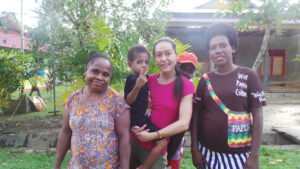Engaged Anthropology Grant: Sophie Chao
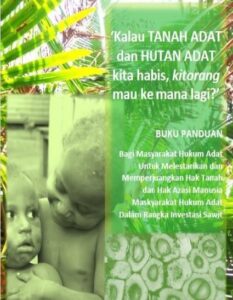
Dr. Sophie Chao received a Dissertation Fieldwork Grant in 2015 to aid research on “Agribusiness Land Grabs and Transforming Indigenous Foodways: Towards a Theory of Hunger and Satiety in West Papua,” supervised by Dr. Jaap Timmer. In 2019 Dr. Chao returned to the field when she received an Engaged Anthropology Grant to aid engaged activities on “Oil Palm Expansion in West Papua: Multi-Stakeholder Workshop on Sustainability in the Agribusiness Sector”.
With the support of an Engaged Anthropology Grant, the grantee organized a workshop on “Oil Palm Expansion in West Papua: Multi-Stakeholder Workshop on Sustainability in the Agribusiness Sector” on 13 – 14 August 2019 in Jakarta. This event was attended by ten indigenous Marind participants (six men and four women) from Merauke, West Papua, where the grantee undertook her doctoral research, as well as thirteen representatives from the Indonesian National Land Agency, the Indonesian Investment Board, the Merauke Regency Governmental District Office, the Merauke Regency Environmental Agency, and local and national Indonesian non-government organizations.
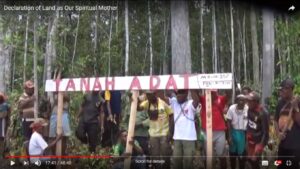
The project allowed the grantee to disseminate the findings of her doctoral research on the social and environmental impacts of oil palm plantations on indigenous Marind communities in Merauke, in the form of an oral presentation, translated thesis chapters, and a summary of the overall thesis in brochure form. This research revealed that agribusiness projects severely undermines indigenous communities’ relations to land – which is central to their sense of collective belonging and cultural identity – and their morally imbued relations to forest plants and animals whom Marind consider their kin through shared ancestral descent. The research also demonstrated that Marinds’ right to give or withhold their consent to land conversions is routinely disregarded in the design and implementation of agribusiness projects. Affected communities lack the capacity to communicate their demands and grievances directly to high-level policymakers and corporate representatives and have limited access to comprehensive information about the palm oil projects affecting their livelihoods and environment. Their capacity to assert their claims to land is further hindered by their limited understanding of their rights under national and international law, and of the redress mechanisms available to them under these frameworks.

The workshop created a multi-stakeholder platform for indigenous Marind representatives to share their experiences of the adverse impacts of monocrop oil palm developments on their livelihoods, land rights, cultural well-being, food security, and physical environment, and to voice their recommendations towards addressing these adverse impacts before government and NGO bodies. In turn, Marind representatives were able to acquire up-to-date information from government and NGO representatives pertaining to the legal and governance structures regulating oil palm production in Indonesia, government targets and sites of future oil palm expansion, and indigenous people’s rights as these are enshrined under national and international legal frameworks and initiatives – including the draft Indigenous People’s Rights Bill and the One Map Initiative in Indonesia. Marind participants were also introduced to the principles and criteria of the Roundtable on Sustainable Palm Oil (RSPO) and Indonesian Sustainable Palm Oil (ISPO), two multi-stakeholder commodity certification standards established to promote rights-based and deforestation-free palm oil.
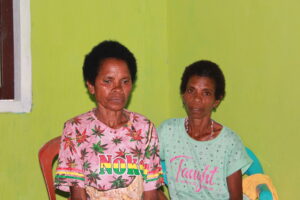
Formal presentations from the participants on the first day were followed by break-out group discussions on the second day, during which the participants formulated a set of joint recommendations for rights-based and culturally sensitive approaches to palm oil production in Indonesia. These recommendations included: 1) moving beyond a “consultation-only” mode of land acquisition towards full respect for indigenous people’s right to give or withhold their consent to land developments 2) more transparent, inclusive, iterative, and collective consultation processes, in which women, youth, and elders are equally involved 3) participatory mapping to support the identification and protection of customary land rights, ownership, and boundaries 4) the development of binding and verifiable safeguards, standard operational procedures, and protocols to protect indigenous communities’ food and water security and cultural food sovereignty and 5) the direct and iterative involvement of indigenous communities in the identification, demarcation, management, and monitoring of conservation zones within oil palm plantations.
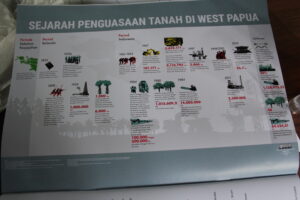
In addition, a documentary titled Declaration of Land as our Spiritual Mother, produced by the grantee during her doctoral research was launched at the opening of the workshop (see Figure 2). This 45-minute film documents various aspects of indigenous Marind’s relationship to the forest, ritual practices, modes of subsistence, and grassroots land rights movements in the face of oil palm developments. A community manual in logat Papua, or Indonesian creole, produced by the grantee and titled Where Are We to Go If Our Customary Lands and Forests Disappear? A Practical Manual for Indigenous Communities on Land Rights and Human Rights in the Context of Oil Palm Investments, was also launched on the occasion of this workshop and copies printed for wider dissemination in the Marind villages where the grantee undertook her doctoral research (see Figure 1). This interactive manual and offers practical guidance to indigenous communities regarding their right to free, prior, and informed consent, the consultation and land acquisition process, and the obligation of states and corporations to respect indigenous lands and livelihoods.
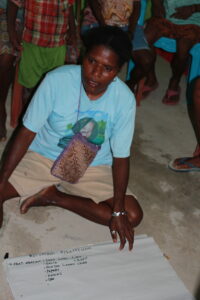
The workshop provided the opportunity for the grantee to discuss directions of future research with the indigenous participants present and the opportunities and challenges (both legal and practical) involved in such research. A draft analysis of the process involved in organizing and holding the multi-stakeholder workshop itself was drafted together with community members and will form the basis of an academic article titled “A Tree of Many Lives: Indigenous Papuan Experiences of Multi-Stakeholder Negotiations and Strategic Ontological Performance,” due for submission to a first-quartile anthropology journal in September 2019.
Drawing from the outcomes of the workshop described above, and with the support of additional funds, the grantee also organized a follow-up regional meeting on 26 August 2019 between indigenous Marind who attended the workshop and local communities in Sorong Selatan, where oil palm development is underway. During this event, indigenous Marind community members were able to share lessons learned from their engagement to date with oil palm companies, to describe the process and outcomes of the workshop help in Jakarta, and to offer guidance and advice to Sorong community members based on their own first-hand experiences. A side-training on participatory mapping and its uses in advocacy contexts was also organized, during which community members produced sketches of their customary lands, boundaries, and sites of cultural, spiritual, and economic value. This will be followed by training in the use of GPS technology in the course of 2019.
